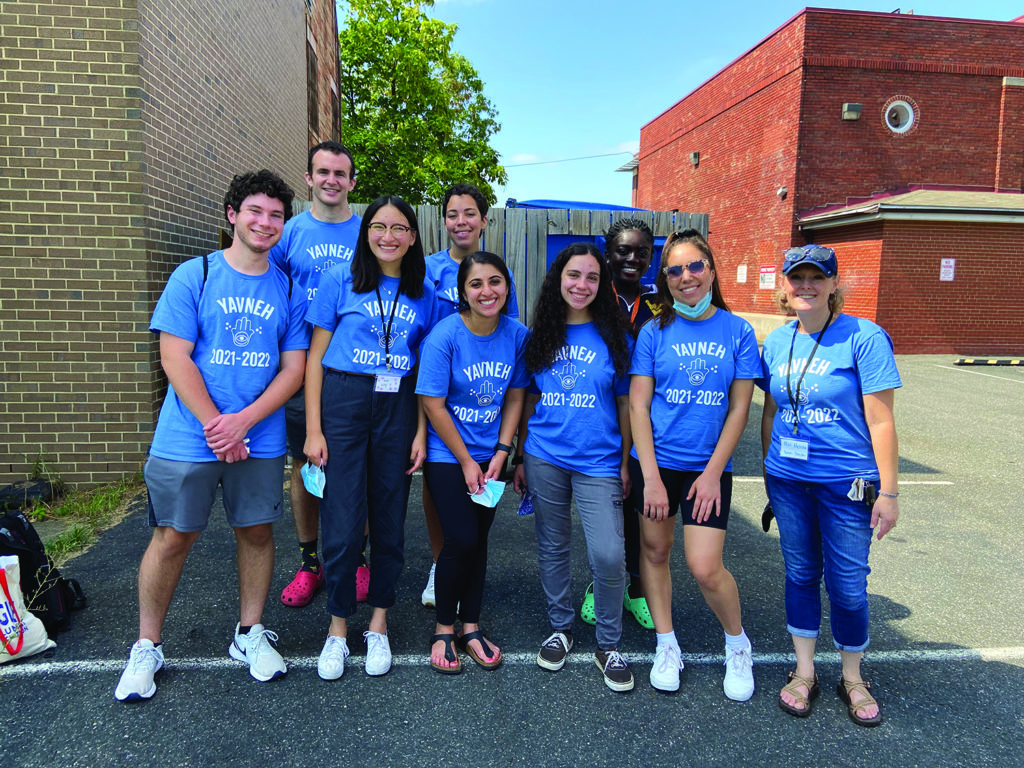
Anybody want to teach?
That’s the gist of an email sent out twice to all 630 families of an area synagogue. Faced with the impending retirement of older teachers, hastened by the pandemic, the synagogue briefly considered waitlisting students. Instead, the emails drew the right number of teachers needed to fill out the staff this year.
The education director considers it only a temporary solution.
Another synagogue education director spent the year teaching 6th grade, in addition to her duties running the school, because she couldn’t find a teacher for the class. Her son even volunteered to teach the 6th graders remotely from his out-of-state college.
A shortage of qualified religious school teachers is a big problem facing synagogues everywhere, say area administrators. The solutions, they say, range from increasing pay, hours and benefits to providing more teacher training and cultivating a pipeline into the profession.
The problem is nothing new, and “the answer is not hiring anybody you can find,” said Rabbi Cherie Koller-Fox, president of NewCAJE (Coalition for the Advancement of Jewish Education) near Boston. The nonprofit organization holds an annual professional development conference that draws several hundred Jewish educators. “If there’s a mother who comes into the school and says, ‘Oh, you know, I spent my junior year in Israel…’ Some are not educated or trained in the field.”
They should be, said Sharon Sherry, director, of community outreach and education for The Jewish Federation of Greater Washington.
“We need professional development for educators — for current teachers and as a recruitment tool,” she said. “There are college students and eager congregants who have the knowledge and need teaching tools. They need to be treated like the professionals that they are.”
Koller-Fox continued, “During the pandemic, people were treated without a great deal of respect for all they were doing. The pandemic was an occasion to cut costs, and people got pretty burnt out.”
TalentEducators is a global nonprofit that addresses recruitment and training of Jewish educators. CEO Aharoni Carmel said, “We have seen the shortage grow tremendously as many programs moved online during the pandemic and changed their hiring practices. Now that they are back in person they need to hire people who are local again.”
Synagogues experiencing shortages are combining grades, creating one job where there once was two or three. Beth Shalom Congregation in Columbia is one of them. “I’m having quite an impossible time finding teachers,” Education Director Louis Nagel said. He posts on JewishJobs.com and advertises at University of Maryland Hillel and at other campuses. He joined an online discussion group of regional Jewish school administrators. There are no recent takers for his Conservative synagogue with 250 families and 78 children enrolled in religion school.
The days of stay-at-home moms taking on Sunday classes have waned, Nagel said. “It seems like they want their own time on weekends, and people are just working so hard at their nine-to-five jobs that they don’t have time for it,” he said.
School administrators say that pay starts at $25 an hour for entry level and increases to $70 an hour for more experienced teachers. That doesn’t account for time spent outside of the classroom. And there are no benefits unless one counts free high holiday tickets, Nagel said. “A wealthier synagogue may send you to an educator’s conference,” Nagel said.
Melissa Werbow runs the nondenominational synagogue school for Hill Havurah in Washington. The Capitol Hill congregation has 200 families and 110 students. “We’re using younger and less-qualified teachers than we have had to in the past,” Werbow said. “It definitely feels like a shift from feeling like I’m giving somebody a gift of a job to feeling like someone is doing me a favor by spending time in our school on the weekends.”
Werbow addressed the curriculum, making it easier to teach with far less work needing to be done outside of school. “It makes it easier for people who are not as qualified or professional to still share their passion and their love of being Jewish even if they don’t have a deep background.”
TalentEducators sees a solution in synagogues working together to create half-time or full-time positions, said Carmel, whose organization is a project of The Jewish Agency for Israel and the Ministry of Diaspora Affairs.
“They can synchronize the classes and days so that one educator can work in two or three synagogues,” he said. “The synagogues can also work together to provide benefits to these educators if they are full time across a few synagogues. The way the system works right now, only directors of religious schools — and sometimes not even directors — are full time. This creates a revolving door of part-time employees who cannot commit beyond that year.”
Jewish day schools and preschools have similar difficulties hiring and retaining teachers, Sherry said.
And of congregational schools, “the smaller congregations are having bigger problems. They are the schools where you’re barely able to have someone answering the phone.”
Julie Tonti, director of educator services for the Council for Jewish Education in Baltimore, said that the city and Howard County synagogues are indeed looking at pooling resources to give teachers the equivalent of a full-time job between more than one synagogue. “We’re looking into all the different schools that we work with and trying to find out their needs. This shortage has been something that they’ve asked for a lot more help on, specifically recruitment and retention,” she said.
One of the motivations for the short-lived B’Yachad Community Religious School was to combine the resources of three Rockville congregations.
Even something so seemingly simple as better communications could help ease the shortage, Sherry said.
Local education directors gather regularly, at meetings arranged by The Federation.
“An education director might say, ‘I need a teacher in Rockville and your teacher is moving from D.C. to Rockville. Could you recommend them to me?’”
Or, “My Hebrew class is on Tuesday and yours is on Wednesday. Do you have a teacher who can do both?”
When it comes to turf, “congregations need to let go a bit,” Sherry said. “We’re getting there.”
Update, July 8, 2022, 7:25 a.m. Sharon Sherry’s role at The Jewish Federation of Greater Washington was updated to her current title.






